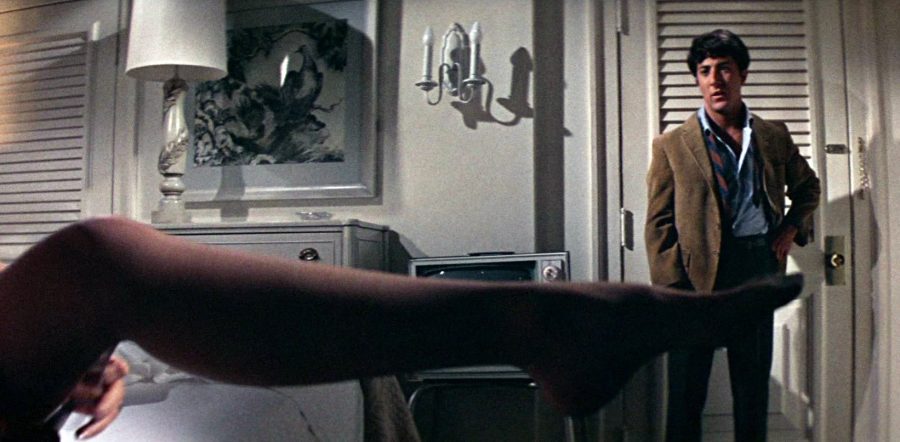One of the defining movies of the 20th century, “The Graduate” celebrates its 50th anniversary this year. Starring Dustin Hoffman, Anne Bancroft and Katharine Ross, this film was ahead of its time in both topic and style, creating a pathway that allowed for the rise of more experimental movies in the ‘70s.
The film opens with the homecoming of Benjamin Braddock (Dustin Hoffman), a recent college graduate. It soon becomes apparent that, while his family and friends consider him to be a successful student with great potential, Benjamin has not fully anticipated what he wants to do after graduation, leaving him confused and empty. Enter Mrs. Robinson (Anne Bancroft), a close family friend who has watched him grow up. Taking note of Benjamin’s despondent attitude, she swoops in, forcing him to take her home after the party and making blatant passes at him. Disgusted at first, Benjamin eventually succumbs to her offers, and the 20-something and 40-something begin one of the most famous affairs of the silver screen. To add to the awkwardness of the situation, in order to ward off his parents’ suspicions Benjamin agrees to go on a blind date with Mrs. Robinson’s daughter, Elaine (Katharine Ross). This causes Benjamin to question if he is dating the wrong Robinson, and he is placed in the increasingly awkward position of trying to end things with Mrs. Robinson and start things with Elaine without having his secret get out.
“The Graduate” focuses on a very disconcerting sexual relationship, but that is part of its purpose — to explore the emptiness experienced by people who feel that they have no direction in life. Benjamin has labored under the impression that what he was doing in school and track was significant, only to find all too late that in the real world they hold no great value and he has to choose a career. Of course, there are many opportunities and careers he could pursue, but finding one that he feels passionate about is troublesome. He believes the affair with Mrs. Robinson will add meaning to his downcast state in some way by making him feel something; instead, it complicates his image of the future even further. Benjamin is the archetype of the post-college student, procrastinating in rebellious manners to avoid an uncertain, intimidating future.
The cinematography of “The Graduate” plays on this message of internal conflict, repeatedly turning to images of Benjamin suspended in water to mirror his fixed state. The love-making scenes with Mrs. Robinson show Benjamin walking from the hotel room to his house with his parents, to being submerged in a swimming pool and back to the hotel room, illustrating the silent, circular schedule his life has taken. This thoughtfully crafted style won the director, Mike Nichols, an Academy Award in 1968. The film was also nominated for an Oscar for adapted screenplay and cinematography. Simon and Garfunkel supplemented and completed the film by composing an original soundtrack for it. The melancholic, poignant nature of the lyrics set the movie to poetry more than music, including the classic song “Mrs. Robinson” to provide further insight into this character’s emotions.
Hoffman, Bancroft and Ross all received Oscar nominations for their performances. These individuals’ acting throughout the movie conveys so much more than what is written in the script. The looks and body movements of Mrs. Robinson alert audience members to her sexual intentions long before suspicions are confirmed. Elaine’s fiery determination provides a perfect element of foreshadowing for her later unpopular and stubborn decisions. Hoffman’s acting as Benjamin ranges from completely passive to frantic frenzies in seconds’ time, externally showing the internal turmoil he’s in. “The Graduate” would not be the same movie if the casting had been even slightly different. Every component of this film was ideally crafted to emphasize its central focus on how having a disinterested, passive view on life can more often than not do significant damage.
To celebrate the 50th anniversary of “The Graduate,” Turner Classic Movies and Fathom Events is sponsoring its screening in theaters on April 23 and 26 across the country, including the local Mira Mesa Stadium 18 and the Mission Valley 20 theaters. Showings are available at both 2 p.m. and 7 p.m. To purchase tickets or get more information on future screenings, visit www.fathomevents.com.
Image Courtesy of AVCO Embassy Pictures















Mr. White Chocolate Chas T • Apr 24, 2017 at 4:17 am
The hero of the story is actually Mrs. R. https://medium.com/@ClownBellRings/the-graduate-was-your-college-professor-c0073a210dd9